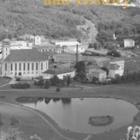Disco, Cornelis. “Accepting Father Rhine? Technological Fixes, Vigilance, and Transnational Lobbies as ‘European’ Strategies of Dutch Municipal Water Supplies 1900–1975.” Environment and History 13, no. 4 (Nov., 2007): 381–411. doi:10.3197/096734007X243140. Downstream users of river water (e.g. municipal waterworks) always face the problem of controlling the behaviour of upstream polluters. In the case of an international river like the Rhine this is exacerbated when there are no international arrangements constraining upstream polluters. This demands flexibility and creativity from downstream waterworks. In this article Disco describes the repertoires developed by the municipal waterworks of two large Dutch cities, Amsterdam and Rotterdam. Two main repertoires are visible: 1) ‘coping’ by means of technical fixes and vigilance and 2) ‘transnational technopolitics’ aimed at institutionalising regulatory regimes to curb pollution. Rotterdam, totally dependent on Rhine water, emphasised ‘coping’ on a day to day basis, placing its trust on technologies of purification and vigilance. Amsterdam, using dune and lake water though envisioning future use of Rhine water, pursued a long-term strategy aimed at improving the purity of the Rhine’s waters—including extensive longitudinal pollution measurements and transnational technopolitics. During the 1950s, the Amsterdam waterworks played a major role in forging international links among waterworks along the Rhine culminating in a sectoral organisation of Rhine Waterworks. This was one of the foundation stones on which the riparian nations were gradually able to build an effective regime for pollution control. All rights reserved. © 2007 The White Horse Press
"Accepting Father Rhine? Technological Fixes, Vigilance, and Transnational Lobbies as 'European' Strategies of Dutch Municipal Water Supplies 1900–1975"
Disco, Cornelis | from Multimedia Library Collection:
Environment and History (journal)


